
Lava Kusa is a 1963 Indian Hindu mythological film directed by C. S. Rao and his father C. Pullayya. The film was scripted by Sadasivabrahmam, Samudrala Sr. along with C. S. Rao and C. Pullayya. The film was produced by Sankara Reddy under Lalita Sivajyothi Films. Lava Kusa is the first full-length colour film of Telugu cinema.

Yaragudipati Varada Rao was an Indian director, producer, actor, screenwriter, and editor known for his works primarily in Telugu, Kannada, and Tamil films. Rao plunged into theatre and did a few stage plays before moving to Kolhapur and Bombay to act in silent films. Rao started his career as a lead actor in many silent films such as Gajendra Moksham (1923), Garuda Garvabhangam (1929), and Rose of Rajasthan (1931). Regarded as one of the greatest filmmaking pioneers of the Cinema of South India, he made motion-pictures across Telugu, Kannada, Tamil, Konkani, and Hindi languages, apart from silent films.

Pedda Manushulu is a 1954 Indian Telugu-language drama film produced and directed by K. V. Reddy. It stars Jandhyala Gaurinatha Sastry, Mudigonda Lingamurthy, Relangi, Vangara, Sriranjani Jr. in prominent roles. The film portrays corruption among so called respectable persons of the society. It was loosely based on The Pillars of Society, a 1877 play by famous Norwegian playwright Henrik Ibsen.
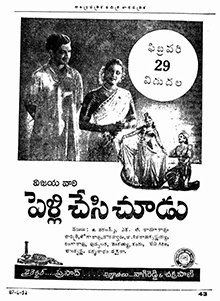
Pelli Chesi Choodu is a 1952 Indian satirical comedy film directed by L. V. Prasad and produced by Nagi Reddi and Chakrapani under their company Vijaya Productions. The film was made simultaneously in Telugu and Tamil, the latter titled Kalyanam Panni Paar. It stars N. T. Rama Rao, G. Varalakshmi, Yandamuri Joga Rao and Savitri. S. V. Ranga Rao, Sivarama Krishnayya, Doraswamy, and Suryakantham play supporting roles in the Telugu version while C. V. V. Panthulu replaced Krishnayya in Tamil.

Sri Seeta Rama Jananam is a 1944 Indian Telugu-language Hindu mythological film, produced and directed by Ghantasala Balaramayya under the Pratibha Productions banner. The film stars Akkineni Nageswara Rao, Tripurasundari, Vemuri Gaggayya, Rushyendramani. Music was jointly composed by Prabhala Satyanarayana and Ogirala Ramachandra Rao. The film marks the debut of Akkineni Nageswara Rao as a lead actor. It is also the debut of Ghantasala as a chorus singer and in a character role. The film was a commercial failure.
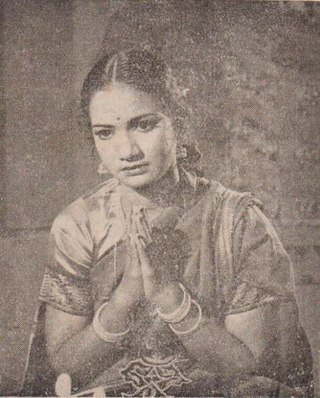
Raavu Balasaraswathi Devi is an Indian singer and actress who performed from 1930 to the 1960s in Telugu and Tamil cinema. She was the first light music singer on All India Radio and the first playback singer in the Telugu cinema.

Vara Vikrayam is a 1939 Telugu drama film directed by C. Pullayya. The film is a reformist social film about the dowry system prevalent in British India. It is based on the novel and play of the same name by Kallakoori Narayana Rao. It is the debut film for Bhanumathi.
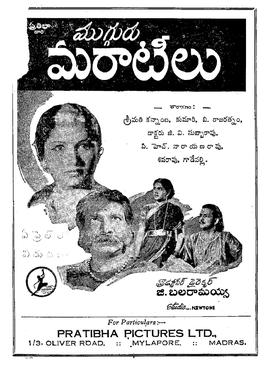
Mugguru Maratilu is a 1946 Telugu-language historical drama film produced and directed by Ghantasala Balaramayya under the Pratibha Productions banner. It stars Akkineni Nageswara Rao, C. H. Narayana Rao, Bezawada Rajaratnam and Kannamba, with music composed by Ogirala Ramachandra Rao. The film was recorded as a Super Hit at the box office and established Akkineni Nageswara Rao in the Telugu film industry.
Koccharlakota Satyanarayana was a Telugu film and drama actor and playback singer during the early period of Telugu cinema.
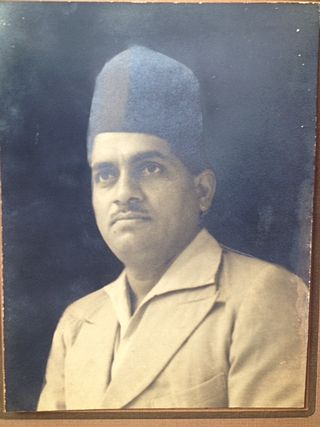
Ogirala Ramachandra Rao (1905–1957) was an Indian actor, music director and multi instrumentalist, predominant in Telugu cinema.
Vara Vikrayam is a famous novel and play with same name by Kallakoori Narayana Rao. It is based on a reformist social theme about the Dowry system prevalent in India.

Mikkilineni Radhakrishna Murthy was an Indian actor and thespian known for his works predominantly in Telugu cinema. He was the founder of the theater group Praja Natya Mandali. He has received the honorary Kalaprapoorna from Andhra University, for his contributions towards Telugu theater and cinema.

Savati Koduku (transl. Stepson) is a 1963 Indian Telugu-language drama film, produced and directed by Y. Ranga Rao. It stars N. T. Rama Rao and Sowcar Janaki, with music composed by debutant Satyam and T. V. Raju taking care of supervision.
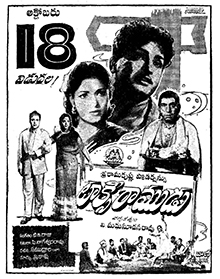
Taxi Ramudu is a 1961 Indian Telugu-language drama film, produced by D. V. K. Raju, K. N. Raju, K. Ramachandra Raju and C. S. Raju under the Sri Ramakrishna Productions banner and directed by V. Madhusudhana Rao. It stars N. T. Rama Rao, Devika, Jaggayya and music composed by T. V. Raju.
Korlam Parvati Vara Prasada Rao, better known by his stage name Vizag Prasad, was a Telugu theatre artist actor known for his negative character artiste roles.

Janardhana Maharshi is an Indian screenwriter, poet, author, producer, novelist, lyricist & film director who works predominantly in Telugu cinema and Kannada cinema. His directorial movies namely "Devasthanam" and "Viswadarshanam" are screened in many Film festivals.











